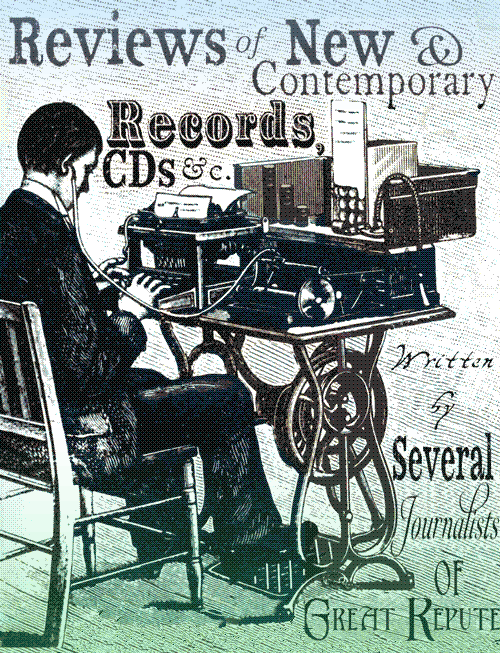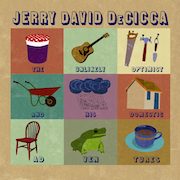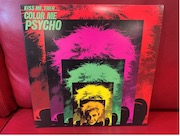 |
 |
| |
|
|
| |
|
|
| |
 |
|
| =
October 2021 = |
|
|
| Green Pajamas |
| The Secret Life of
Love Songs |
| Jerry David
DeCicca |
| Color
Me Psycho |
| Communicant |
| Nova
Express |
| Shannon
Lay |
| Gnod |
| |
| |
| |
| |
| |
| |
| |
| |
| |
| |
| |
| |
| |
| |
 |
THE
GREEN PAJAMAS – SUNLIGHT MIGHT WEIGH EVEN MORE
(CD
from
Green Monkey
Records)
A
new album from the Green Pajamas is always
something to be celebrated, and this 16 song
collection is especially welcome given that it’s
all brand new material, the majority of which
was written and recorded by Jeff Kelly. Not that
there’s anything the matter with Joe Ross’s
first written contribution since 2011, the
gloriously singalong ‘Down to the Ocean’, or
Eric Lichter’s excellent contributions
‘Sunlight’ and ‘Lover’s Lease’; but, well, even
George Harrison only wrote one song per side for
the White Album, and when there’s a songwriter
of the calibre of Jeff Kelly in the band and
he’s obviously hit on a rich seam, it makes
sense to give him his head.
And
head
music is definitely what this record is all
about. Readers will no doubt fondly remember the
string of outrageously psychedelic albums the
Pajamas recorded in the late ‘90s for what was
at the time the next best thing to an in-house
Ptolemaic Terrascope record label, Tony Dale’s
Camera Obscura. ‘Strung Behind the Sun’ was a
personal favourite, and it’s no coincidence that
most of that was written by Jeff too. The new
album is intentionally intended to recapture the
whimsical experimental psychedelia that pervaded
the band’s records of that era, and is sprinkled
with appropriately exotic instrumentation,
strong vocal harmonies and occasional birdsong,
rainstorms and sound effects thrown in for good
measure. It’s never less than glorious, and when
Jeff kicks in with some of his trademark
electric guitar licks it becomes absolutely
outstanding: ‘Art School Blues 1979’, ‘High Tea
With Miss Ava G’ and the album’s finest moment
amongst a slew of fine moments, ‘Just To This’
with its middle-eastern backing, fine drumming
and killer guitar break are all songs to
treasure amongst a veritable treasury of songs.
Elsewhere
‘That’s
Why Celia Can’t Fly’ has a Byrdsian jangle; ‘I’d
Rather Be In The Sun’ is piano-led with
hauntingly echoed vocals which adds a dash of
melancholy – and fittingly bleeds into the next
song ‘High Tea With Miss Ava G’ courtesy of the
sound of a Portuguese rainstorm, which is a
particularly Jeff thing to do. ‘Why Did You Do
It’ has a heavier vibe and ‘I Don’t Believe You’
chills with a backwards girls school choir, and
it’s left to ‘Hello, Hello’ and ‘Falling In And
Out of Love’, both supremely Beatles-esque,
simply great pop songs, to lift the spirits
before the closing ‘Holly’ (although
keep the CD player running and you should hear
an uncredited alternate, upbeat version of
Jeff’s ‘I’d Rather Be In The Sun’ as well)
Released
at
a time when the world is debating the merits of
vaccinations, this is exactly the shot in the
arm we all need, guaranteed to put a smile on
your face, make you long throw your arms around
your loved ones and get us all up and dancing.
Or at least nodding along, given that we’re all
getting older.
(Phil)
|
|
|

|
THE
SECRET LIFE OF LOVE SONGS –
TIM LUCAS and DOROTHY MOSKOWITZ
(book
and
CD from PS
Publishing)
This
is
an interesting one to immerse ones’ self in
after a session with the Green Pajamas, as there
are distinct similarities in the subject matter
and occasionally with the music, which,
particularly like some of Jeff Kelly’s solo
outings, has a Gothic, occasionally mediaeval,
vibe, carried primarily on the back of synths
and keyboards.
The
hardback
book was originally written by author Tim Lucas
for a planned (but unpublished) anthology of
fictional prose inspired by the work of Nick
Cave. It’s presented in the form of a lecturer
taking the stage to discuss the history of the
Love Song, with the soul, the inner workings, of
each song considered and evoked in some detail.
I think it was Martin Mull who once observed
that writing
about music is akin to dancing about
architecture; it’s an ultimate pointlessness
which has haunted my own career as a music
journalist for forty years, and although Tim
Lucas’ insightful portrait of an obsessive
gets us no closer to an answer, his prose is
quite masterful in places, and he comes as
close to defining the mystery of love and
the poetry of music as anyone else has ever
done.
The
first
300 copies come with a CD of accompanying music,
and if you’ve been wondering what McMullen’s up
to filling the Terrascope’s reviews columns with
poetic meditations on the mystery, the humility
and the majesty of love, here’s why. Five of the
songs which originally started out as poems,
‘Desert Mariner’, ‘Under the Nine’,
‘Ambidextrous Heart’, ‘The Smell of Cedar’ and
‘Trust in Love,’ were set to music by Dorothy
Moskowitz (and the author) between 2017 and
2020, and a sixth, an adaption of Thomas Hardy’s
‘A Broken Appointment’, was also co-written by
Tim Lucas and Dorothy Moskowitz.
It
was
Dorothy in fact who alerted me to the release of
the book. We’ve stayed in touch sporadically
ever since the Ptolemaic Terrascope published a
major interview feature on her band The
United
States of America (fondly remembered, as I
pointed out at the time, principally for their
remarkable contribution to the ‘Rock Machine
Turns You On’ compilation on CBS that was the
backbone of many a 1970s record collection, ’I
Won’t Leave My Wooden Wife For You, Sugar’); she
later toured with Country Joe McDonald
(providing backing vocals on the 1973 LP ‘Paris
Sessions’) so
as you can well imagine, I was intrigued to hear
what she’d been up to of late.
Lyrically,
the
material is just as strong as you’d imagine
given the context. Musically, as I alluded to
above, there’s a shapeshifting, ghostly gothic
feel; melodic rather than percussive throughout,
with a deftness of touch which, much as you’d
expect, comes courtesy of Dorothy’s skilled
multi-instrumentation. She also sings and plays
piano on ‘Under the Nine’ and ‘The Smell of
Cedar’. The songs which really jumped out at me
immediately were ‘Desert Mariner’, ‘Ambidextrous
Heart’ and the alternate version of ‘Under the
Nine’ which is included as a bonus, all of which
feature guitar work courtesy of none other than
Gary Lucas, who has been a member of the Magic
Band on and off since the 80s (including the
‘Ice Cream for Crow’ album, a favourite
hereabouts).
I’m
not
too sure how fast this one will sell, but 300
CDs seems a good number to me so hopefully if
you move quickly enough you’ll be able to grab a
copy. Definitely recommended!
(Phil)
|
|
|

|
JERRY
DAVID DeCICCA – THE
UNLIKELY OPTIMIST AND HIS DOMESTIC ADVENTURES
(LP
from
Worried
Songs)
Easily
my
favourite record label anywhere right now, not
least for the pure analogue and DIY aesthetic
that pervades everything they do, Jerry David
DeCicca’s solo album ‘The Unlikely Optimist’ is
almost certainly the release that’ll see Worried
Songs and their affable manager Chaz Hewitt
promoted at the end of this season to the First
Division.
It’s
the
third (I think) album released by former Black
Swans leader Jerry David DeCicca since he
applied his unique perspective on songwriting
and his unmistakably gravelly voice to
refashioning himself as an outsider
singer-songwriter in the cosmic Americana field,
and he’s assembled quite a cast of Texas
compadres to accompany him including Augie
Meyers of the Sir Douglas Quintet, Ralph White
of Bad Livers, Scrawl’s Jovan Karcic, DeCicca’s
partner Eve Searls and his former Black Swans
bandmate Canaan Faulkner. Together they’ve
somehow fashioned a fabulous mix of country,
folk and hard rock plus the occasional hint of
psychedelia.
There’s
a
clue to the album’s title in a statement issued
with the record. “My whole life, I’ve
struggled with anxiety and depression,”
DeCicca is quoted as saying, “But through
music, people who love me, and meaningful
work, I’ve gathered enough light to keep
getting out of bed. And, in my own way, I’ve
become a more positive person and I feel very
lucky for that.”
The
“domestic
adventures” referenced in the title include such
gems as ‘Country Cookie,’ ‘Grape Jelly’ and
‘Coffee Black’. The excitement really builds
though when DeCicca leads his band of minstrels
out into the great outdoors. The nearly 11
minute long cosmic-country road epic ‘West Texas
Trilogy’ features the outstanding opening line “I
can smell gasoline and tacos,” and “I See
Horizons” (for me the strongest track on the
album) features DeCicca’s grizzled and stubbly
narration backed by some lively saxophone and
incisive electric guitar.
Although
recorded pre-pandemic, this paean to the simple
pleasures of food, home, holding on tight to the
ones you love and reflecting on the great
outdoors makes it very much a record of our
times. Love it.
(Phil)
|
|
|

|
COLOR
ME PSYCHO - KISS ME, THEN...
(LP
on Lance
Rock Records )
Originally released on low-budget cassette in 1986, this short sharp
collection of cheap and cheerful thrills by this
Calgary outfit has been dredged up from the
primordial ooze and given the limited edition
vinyl treatment by Canada’s Lance Rock Records -
previously shelter for the likes of Neko Case
and Man or Astroman? Featuring 10 tracks crammed
into 27 minutes, it sounds like the frenetic
outcome of ingesting Chernobyl-grade food
additives and too much cheap pop (soda if you
prefer). Channelling the fertile retro-garage
sound beloved of Lipstick Killers, The
Fuzztones, early Cramps and all manner of swamp
things, it also packs a raft of song titles that
has me scrambling for a safe word.
‘Mr Invisible’ invokes master of schlock horror Roky Erickson loaded up
on steroids and shoved through the mincer of 70s
Punk Rock. You’ll swear you’d first heard ‘Shove
Your Love’ on some Nuggets/Pebbles collection,
such is its 60s playbook authenticity and has me
groping around for the striped t-shirt and
cheesiest of indoor shades. The organ-driven
‘Transylvanian Erotica’ is undoubtedly the
classiest thing here. At over three and a half
minutes long, it’s also practically Wagnerian in
scope, and if Shadows-style guitar is what
you’re Hankering for, well it packs that, too.
Driven by a riff owing to ‘Communication
Breakdown’, ‘Lovers Leap’ has its rough edges
rounded by organ and a smattering of lead
guitar, but still delivers a chorus worthy of a
minor punk rock classic. Add the perhaps
unconscious nod to energised, Dr Feelgood type R
’n B that is ‘Suffocation Girl’ and you come up
for a welcome lungful of air after a little shy
of 14 full-on minutes. That’s pretty impressive
5k pace.
Flip the download and there are five more smackers in similar vein over
on Side B. Whereas ‘Genius At Work’ features
some surprisingly deft and melodic keys in the
mid section. ‘Shatter City’ sounds incongruously
like The Damned covering Bob Seger - file that
one under “strange but true”. Referencing 1966
(not unreasonably) ‘Black Corvair’ hews out a
catchy, economical sound that The Hives would
later work to good effect, but for your 60s
exploitation film score (and retro theme party)
then look no further than ‘Grand Guignol’, which
packs every facet of the band’s sound into three
action-packed minutes, providing a most fitting
finale.
Yes it’s corny (and, occasionally, creepy) but so what? It’s gleefully
and, at times, artfully executed and, above all,
fun, and we need a bit of fun right now, no
matter how exhausting. It’s
time
for my lie-down, now. Meanwhile, nobody drains
that swamp, right?
(Ian
Fraser)
|
|
|

|
COMMUNICANT – SUN GOES OUT
(LP, Digital on Bingo
Masters Records)
This debut album by Communicant is some
of the best dreamy melodic psych to grace these
ears in quite some time.
The LA-based band, led by talented
songwriter Dylan Gardener, first started
releasing some of these songs in 2020 and into
this year. This
included lead single, the Revolveresque “She
Moves the Sky,” b/w the garage fuzz of “Prisoner
Cloud” on a Hypnotic Bridge ‘45 in November.
But the full-length is a fully realized
whole that’s far better than a sum of the parts.
You could point to many practitioners of
modern melodic psych with which to compare, but
the closest one to me is the band Temples, with
its ultra-catchy hooks, big choruses and
occasional call-and-response (or just “call”)
style.
Gardener’s vocals are almost always
treated by some studio effect, whether it be
heavy reverb, phasing, Leslie, or telephone
voicing. The
songwriting is original, thoughtful and
immediately enjoyable.
The band is tight, and the production
first-rate, painting the tunefulness of the
songs with a retro-cool lava lamp glow.
The songs contain loads of brief easter
eggs (intentional or not), whether it be teasing
‘Tales of Brave Ulysses’ in the middle of
“Sleepwalker,” the jangly ‘So You Want to Be a
Rock ‘n’ Roll Star’-like intro of “Come Down,”
or the hint of ‘It’s All Too Much’ in the intro
of “She Moves the Sky” before it veers into
‘Tomorrow Never Knows/Rain’ territory. But
those
are moments, while the span of work is all
Communicant’s own.
The sequencing perfectly balances tracks
between sunny psych pop rocks, woozy lysergia,
and mysterious beckoning rabbit holes.
I must give particular credit to “The
Wheel.” The
song’s album version is cast in creeping Merlin
sorcery. It’s
an earworm, like everything on the album, sung
by Gardener in his pleasing tenor.
However, in a separately released single
well worth seeking out, Communicant reimagined
and re-recorded the song as “La Roue,” a French
language version sung by Natasha Recoder.
Newly appointed with sweeping strings and
Recoder’s coquettish vocals, the song takes on
an entirely different, slinky feline Gallic feel
equal to or better than the original.
(Don’t you love it when an artist creates
two equally fine versions of a song?)
“Housefly” is in some ways The Wheel’s
distant cousin, starting deep in REM state
before sprouting tiny wings (and rhythm section)
and taking Kafkaesque flight.
The two songs back-to-back are an
excellent one-two punch.
“Housefly” is the sort of song you
realize after repeated album listenings, once
you move past the easy pickings, “oh, this
is the song.”
Sun Goes Out is strong from the opening
gun to the finishing tape.
It takes, oh, about five seconds to
settle in happily for the joy ride.
Dylan Gardener’s songwriting is fresh and
instantly accessible, the arrangements and
production exceptional.
It’ll be fun to see what surprises he and
Communicant can conjure up for #2.
(Mark
Feingold)
|
|
|

|
NOVA EXPRESS - TWENTY ONE
(LP/DL from Music | Rocket Recordings (bandcamp.com))
When Torbjörn Abelli of Sweden’s renowned Träd Gräs Och Stenar said of Nova
Express’ One album on its release in
2001 that "This
album will mature and be perfect 20 years
from now" he was bang on the money. As long term forecasting goes this has to rank
as the gold standard. A shame he never got
to see it bear such fruit.
Forward twenty years later and the
original double album has received a
re-master, a re-sequence and has been
trimmed down to a single disc. And it’s all
thanks to Rocket Recordings and their
frighteningly impressive and efficient
Swedish underground network.
What is it with Rocket and
Swedes? No, that’s not an on-trend recipe out of
the Guardian Saturday food supplement, by the
way. I
mean what is it that Chris Reeder and John
O’Carroll have tapped into, a sort of sonic
Scandi noir (except the vinyl is so rarely black
these days) Twenty One continues a recent trend of breathing fresh life into what
would otherwise have continued to be neglected
gems - see Terrascope’s Urdog review from March
2021. If anything, this one is even more
special. In fact it’s a truly remarkable
reminder of the days when the ears were fresher
and the mind still malleable and receptive.
Verily, we have returned to the sunlit uplands
of yesteryear.
If you can imagine
organic, psychedelic riffing on a basic theme of
Moondog’s ‘Bird’s Lament’ then you are already
some way towards appreciating Twenty
One. It seems a strange thing to admit,
coming from a rudimentary guitarist very much
attached to his strings, but there is a
refreshing lack of reliance on guitars
throughout. It serves to free the sound and
allows for greater exploration on the part of
the listener and, one might daresay, the
musicians. Lars Ydgren’s clarinet may be an
unlikely lead instrument in the rock canon but,
together with his sax and flute and with, Henrik
Khilberg’s keys, can lay claim to being the
defining sound of Nova Express. Acker Bilk it
ain’t. The clarinet provides a warmth and
mellowness that lends the album this a laid back
and almost pastoral feel.
Where there is repetition
on Twenty
One it doesn’t betray any shortage of
ideas. This is the aural equivalent of a skilled
artist who, building shade and texture, knows
precisely when to put the brush down. Compare
this with the original version on Spotify (or
indeed if you are lucky enough to own an
original) and the titivated mastering makes for
cleaner, brighter sonic experience. Having made
the difficult decision to jettison a couple of
tracks in order to shrink to fit (including,
sadly ‘Nova 7’) it’s also, arguably, more race
fit. Similarly, by re-sequencing those tracks
that made the cut it makes the journey enjoyably
different. Not that there was anything amiss
with One
you understand. As the Swedish soothsayer said,
by 2021 One
would be perfect, and it pretty much is.
It’s just that Twenty One might reasonably lay claim to being even more so.
A liturgical organ
introduces us to ‘Freedhall’ before loping
gradually into a ‘Maggot Brain’, but one where
Eddie Hazel’s lead guitar is usurped by Ydgren’s
plaintive reeds. ‘Wave To Each Other’ (the
original album’s opener) has a bit of fun with
Mr Theremin before skipping along at a fair old
a canter and oodles of synth dabbling and jazzy
woodwind that’ll delight those of us who cut our
teeth on Flying Teapot. Meanwhile, ‘Trees Grass and Stonehenge’, which makes
for a cheeky play on the name of That Band
provides a wonderfully floating way of seeing us
to mid-point. Out on Side 2 and ‘Nova Express’
finds Neu breaks bread with Vernon Elliott and
Oliver Postgate, names that will probably mean
diddly-squat to
our Swedish friends and colleagues and indeed
precious little to anyone here under 45 years of
age. No matter. Mesmerising and otherworldly
it’s a tantalising glimpse of being back in The
Garden, or at the very least one that backs onto
Pogle’s Wood. ‘Bussen’ is indeed a magic bus, a
more contemplative drone in which the guitar
plays a repeated, beautifully unfussy melody,
one that even my aforementioned rudimentary
skills are able to mimic, proving that
pyrotechnic dexterity isn’t necessarily
synonymous with effectiveness. As
it builds, Ydgren’s sax weaves all about,
linking with and soaring over some spectral
synths. The result is that ‘Bussen’ ranks as
possibly the most exquisitely diamond of all..
This just leaves ‘Spektra’. From squelchy
beginnings it seems in danger of going all
Chicory Tip on us (what, you don’t remember ‘Son
Of My Father’) but soon returns reassuringly to
Rother-hum. Another
sensory feast, you can practically see and feel
the music by this point, and yet, in some
respects it seems the least essential of this
most compelling of collections. That isn’t even
a quibble. How it must have been an unenviable
task to decide what tracks to include and which
to discard when you can hardly shove a Big Bambu
between them quality-wise.
So, there we have it, Twenty
One ... quite possibly the best Kosmische
album never to have come out of Germany. Or for
that matter Japan. Whether or not it’s the best
thing I’ve heard in twenty one years, I can’t
say, although right now it’s hard to think of
too much that comes close, let alone surpasses
what ranks as a near-pinnacle of listening
experience. Now there’s a tendency for gushing
reviews like this to sign off with some fulsome
recommendation or other. On this occasion that
would constitute something of a disservice. This
is a must have, pure and simple. It’s what
Compulsory Purchase Acts were intended for. Now
what are you waiting for?
(Ian Fraser)
In the process of waxing lyrical, Ian Fraser
spoke with Rocket Recordings’ Chris Reeder
about what prompted the label to re-issue of
an obscure twenty year old album, and the
issues it faced in doing so.
Mind duly blown, can I just ask how you hit upon
this one and why release it now?
Not sure how we discovered
it to be honest. I think someone we knew from
one of our Swedish bands shared this track and
then we did some research and found out that one
of the collaborators in the band was in an
incarnation of The Liberation (Josefin Öhrn's
band). Then we found out Rickard from Flowers
Must Die knew one of the main guys from the band
so we got chatting.
When we saw the Torbjörn
quote and realised it was 20 years since its
original release, it was a no brainer. We had to
do it. The stars had aligned!’
How serendipitous is
it that One
was first released on a label called Rocket
Number Nine Records?
Oh, we love happy little
accidents like that. You just know then that it
was meant to be.
The original was a double album, this is a
single disc. Why is that?
We did consider releasing
the whole thing, but pressing a double LP by a
band no one knows was just too much of a risk
right now. Manufacturing prices have gone crazy
out there, plus with the effects of Covid and
Brexit adding to already desperate capacity
issues it is a scary time. Stripping it down to
a single disc made most sense, both from the
standpoint of timing and our customers’
wallets.
‘Nova 7’ and
‘Jens’ failed to make the cut. Was there any
particular reason for choosing what made it
in, or was it simply ‘best fit’
Johnny and I compiled what
we thought were the best sounding tracks and
what made the most interesting listening
experience. When we sent the track choices to
the band, they agreed that we had definitely
picked the strongest tracks. So we knew we’d
chosen wisely.
Likewise what
prompted your decision to tamper with the
running order?
It was re-sequenced for
the greater listening experience. We chose which
tracks and in which order we felt worked best to
create a great and interesting journey. And
obviously you have to take vinyl side lengths
into consideration when sequencing as well.
Is there any
chance we’ll get to hear the ‘lost tracks’?
Maybe at a later date
we’ll think about a limited vinyl edition of the
other tracks, when (or 'if') the crazy
manufacturing situation we find ourselves in
calms down a bit. Or the tracks may appear on a
future comp or something. But whatever, we will
re-master them like we did with the tracks on Twenty One, the originals needed a lift to make them sing better on
vinyl.
You’ve
recently helped us rediscover Urdog and now
this. What further lost treasure do you have
in store for us?
Johnny and I do have lots
of great, forgotten albums in the collections,
and like Urdog we may one day feel they need to
be reintroduced to today’s audiences, so watch
this space!
Nova Express
follows in the rich Rocket tradition of
championing Swedish acts, the roll call of
which seems to get bigger by the year. Isn’t
it high time you and Johnny were rewarded for
contributions to Swedish musical export?
Ha! Well if they ever want
to make us honorary Swedes then I will always be
happy to take them up on that offer...I do like
the idea of moving to Gotland!
|
|
|

|
SHANNON LAY - GEIST
(LP, CD, Digital on Sub
Pop Records)
This is a lovely folk album, with a
perfectly autumnal feel for right about now.
Lay is an LA-based artist who’s done both
rock (Ty Segall’s Freedom Band) and her own solo
music on the folkie side.
On Geist, she combines delicate
finger-picked acoustic guitar with her ethereal
voice and tasteful accompaniment.
Geist is German for “spirit,” and the
album has an abundance of it.
She sings about love, friendship, and
most of all, a willingness to embrace change.
Opener and lead single “Rare to Wake” is
probably the album’s finest track.
The recurring, descending guitar motif
leads into a very David Crosby-meets-Linda
Perhacs melody, full of mesmerizing repetition,
dips, swoops and rabbit holes.
When Lay’s vocals make their entrance,
the effect is stunning.
She intones the album’s mission
statement, “Have you always been who you
are?/Without change, something sleeps inside us,
rare to wake.” The
soft, slightly jazzy electric piano by Ben Boyce
adds a perfect enhancement, as if the song
wasn’t already hypnotic enough.
Due to pandemic pressures, rather than
play together live, Lay had to send out her
basic tracks long distance to the above Ben
Boyce (Bonnie “Prince” Billy, Ty Segall) and
Devin Hoff (Sharon Van Etten) to color in the
spaces, which they do in a masterfully
understated way, with bass, cello and acoustic
and electric pianos, and flute.
“Shores” is a beautiful, slow waltz of a
tune. Lay
sings of the often times bittersweet effect on
relationships when one person makes a sweeping
change in their life.
Ty Segall adds a guitar solo, trying his
best to tone down his hard rock style for this
quiet track. “Awaken
and Allow” has a Celtic quality, with Lay
singing a capella off the bat, followed
by a rising drone of strings behind her.
The message is again about change, with a
barb about the toll of frequent wildfires, “I
have to get out of California/The days go by
like smoke in the wind.”
It’s an interesting side note to the
record’s frequent commentary on the necessity of
enjoying and appreciating nature.
I really love the drifting-in-the-mist
“Untitled,” which returns to the ethereal
Crosby/Perhacs quality from “Rare to Wake.”
(I’ll also confess to a personal
adoration of songs called “Untitled” – haven’t
heard a bad one yet.)
Lay covers Syd Barrett’s “Late Night”
and I almost wish she hadn’t, because you
mention Syd Barrett and every one rushes to that
track instead of the remarkable originals which
make up the remainder.
Still, she manages to adapt it seamlessly
to the style of the album, bringing her own
personal touch to this sensitive, intimate song
about love and longing.
The album closes with instrumental coda
“July” (I love instrumental closers, too, almost
as much as “Untitled” songs).
It’s just Lay’s guitar picking, with some
cello and soft vibes in the background.
It conjures up a gorgeous twilight
setting, not trying too hard, just that final
sip of wine before going in.
Geist should rightfully propel Shannon
Lay into the pantheon of contemporary folk
troubadors. The
album
is beautifully and lovingly crafted all-around.
Her songwriting, guitar work and
plaintive voice may be crisp as apple cider, and
perfect for that late afternoon stroll amid
falling leaves, but this album will be
evergreen.
(Mark
Feingold)
|
|
|

|
GNOD
- LA MORT DU SENS
(LP/CD/DL from Music
| Rocket Recordings (bandcamp.com))
And so it comes to pass, a new Gnod album. In case it appear that they
now come around seasonally rather than annually
(a bit like Christmas seems to) it’s worth
bearing in mind that our last encounter with
them, just a few months hence, was the
time-marking career retrospective Easy To Build, Hard To Destroy. In fact it’s hard to believe that
it is more than three years since their last
non-collaborative full-length release.
The leanness and ferocity here carries the blazing torch of 2018’s
seismic Chapel
Perilous and indeed the brace of offerings
before that. Well if things looked pretty grim
up North back then, they look a damn sight
bleaker all over, now. Appositely, the title
translates as ‘The Death Of Meaning’ which for
the fatalists among us kind of resonates,
n’est-ce pas? The fact that it’s French may be
the contrarian Gnodders thumbing their noses at
a certain tousle-mopped Ear Flicker in Chief
who’s overly fond of his Gallic goading. Or
perhaps not, either way, it works both as a
brutalised statement of art and of intent.
‘Regimental’ sputters into life with scrambled radio broadcast samples
before being borne aloft by riff, power chords
and trademark shouty vocal. So far, so
viscerally Gnod. On the aural screed of ‘Pink
Champagne Blues’, the two-drummer propulsion
resurrects Twink-era Pink Fairies (previously
Jesse Webb had only sounded like two drummers.
Glad to see he now has help), while ‘The Whip
And The Tongue’, is a more angular math-rocker,
a bit like Shellac with souk reeds. True to form
it’s all calculatingly bleak and disturbing.
Sobering, too, to think that we still need
tracks called ‘Giro Day’ in this day and age.
It’s enough to get your BACS up. ‘Migraine’
might also be something that springs to mind
after 12 minutes of relentless pummelling. At
once glorious and galling, it has this Gnod
trick of being seemingly stuck in the same
groove to the point that you want to give the
needle a nudge (not easy with downloads, believe
me) before freeing itself thereby launching into
different dimensions, each parallel universe
seemingly more attritional than the last. Still,
it’s being so cheerful...
As mentioned, Gnod have been ploughing (or should that be harrowing) this
furrow for a while now. It’s a brave man who’d
advocate a full-blooded return to 2015’s marmite
splattered triple album Infinity Machines. However, there was a time when they’d delight in
making people second guess them. Perhaps they
are due a change of direction. Good luck getting
the brakes to work on this particular bus,
though. On this evidence they still have plenty
of momentum. Turn it up, then.
(Ian
Fraser)
|
|
|
|
|
|
|
|
 |
|

